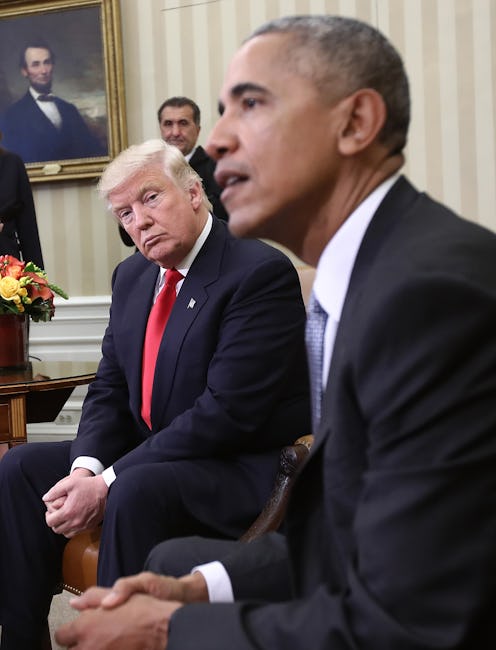News
Democrats Can't Rely On Obama In The Future

It's been a month and a half since the 2016 election, and even though the campaign cycle felt interminable, we're still discussing it, and trying to figure out what happened. President Obama, who is still in office for just a few more weeks, weighed in with some thoughts. Obama spoke with his former advisor, David Axelrod, on his podcast, The Axe Files. He unleashed a hit on both the incoming president and the woman he hoped would beat him when he said that if he had run against Donald Trump (which he couldn't, due to the 22nd Amendment), he would have won: "I'm confident that if I — if I had run again and articulated [my vision], I think I could've mobilized a majority of the American people to rally behind it."
I believe that Obama is almost certainly correct — he could probably have beaten Trump. Obama did better than Hillary Clinton with some of the most important groups that could have helped her win. He got better turnout among African Americans and young voters, which could have potentially made the difference in swing states like Florida, North Carolina, Pennsylvania, and Michigan. He also did far better than she did among white voters without college degrees, who flipped from Democrat to Republican in key states like Wisconsin, Michigan, Pennsylvania, Iowa, and Ohio. Because Obama ran for president having only served one term in the Senate, he also would not have had to deal with the same kind of scrutiny Clinton faced over her use of a private email server as secretary of state, and he would not have had to deal with the "October Surprise" of James Comey's letter to Congress.
Also, when Public Policy Polling asked this very question, it was a landslide:
Obama's comments seem to annoy Trump:
This strikes me as a silly reaction from the president-elect. Regardless of whether Obama would have beaten Trump, the reality is that Trump did beat Clinton, and will soon get to move into Obama's bedroom.
But what this hypothetical does teach us is something that should be worrying for Democrats: Obama was a once-in-a-generation kind of political talent whose success cannot be easily replicated. Obama formed a powerful coalition of enthusiastic minority groups and young people, while holding on to the traditional Democratic base of the working class and urban cosmopolitans. When Clinton tried to claim his mantle, she found that the groups that had been enthusiastic for Obama were more tepid toward her, and the working class abandoned the party en masse. Even with Obama explicitly tying his legacy to a Clinton win, he couldn't transfer support for himself into support for her.
Going forward, the coalition that Obama held together is expected to continue growing, and a politician who can replicate his success could win even bigger margins than he did. But the problem is that, as far as anyone can tell, there simply isn't anyone quite like Obama. Clinton couldn't become the new Obama. For Democrats to win again, they have to find someone who really, truly can, but they also need to build a better party structure that isn't so dependent on one leader. The Democratic playbook can't be built around on person, and if the party leaves 2016 with that lesson, there may be hope for the future.